Organising and planning the logistics of an event is no easy task, let alone trying to get people to show up!
Unless you’ve been under a rock for 20 years, you’ll know that relying on the distribution of flyers, mail invites and word-of-mouth will not guarantee you the results of a successful event.
Promotion should be half the work (and half the fun!), and utilising the power of social media allows you to expand your audience reach and generate buzz about your event online.
Here, we will analyse social media tactics that have remained relevant, as well as upcoming trends you should know about.
1. Create a Facebook event on your business page
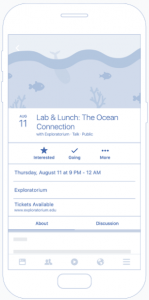
Although obvious, this point is crucial if left out. With over 650 million active users, creating a Facebook event is the most effective way to gain exposure, retain attention, and manage engagement for your event. Most users will have their Facebook calendar synced to their mobile devices, making it easy to plan their personal schedules around your big day.
When naming your Facebook event, make sure it’s fun, memorable and informative. Nobody wants to attend your dull sales networking event (unless you make it sound like it isn’t!).
Title ideas you could look to incorporate include Breakfast Briefing, Speed Networking, Hackathon, Conference and Workshop.
Pro tip: Alliteration. Event titles that are easy to share and remember often use this technique, with examples including Drink Digital, Ted Talk or Golden Globes.
Once you’ve optimised your Facebook event, updated its location, description and created an eye-catching cover photo, make sure your event is never left unmonitored!
Post, engage and update your audience with interactive and thought-provoking content to retain their interest, and ensure you lock their chances of attending your event.
2. Invest in video marketing – “Is it viral yet?”
An extremely powerful content tool, video traffic is predicted to drive 82% of the global internet by 2021 – and the event business is feeling its effects.
Utilising video marketing in your event promotion strategy can help to drive engagement for people who have already confirmed attendance, as well as persuade and create conversations for possible attendees.
Videos are easy to consume and have the potential to connect with people on an emotional level, which is an effective opportunity to establish your brand’s event as credible in your industry.
By offering a teaser video beforehand, you are giving users a future look into an experience – and that’s exciting!
Take a look at this short video teaser example for SMX London that’ll leave you wishing you were there.
If you are running your event for the first time and do not have previous event content to create a teaser video, fear not! Another option that works just as effectively is to film content on the day of the event and create a post-event recap video.
Recap video tips:
- Include testimonials from a range of different people: you want your online audience to imagine themselves there.
- Keep it short and sweet: concentrate on making it engaging and exciting.
- Film all aspects and areas of the event: set the tone; does your event bring people together? Is it fun?
Serving the same purpose as a video teaser, the aim for any video type is to create engagement and buzz around your event.
3. Collaborate with influencers
The more social platforms, the better!
What better way to promote your event on social media than to utilise unique audiences aside from your own?
Take a look at this live music event Spotify launched in collaboration with grime and hip-hop influencers that resulted in wide press coverage, extensive social shares and a sold-out event.
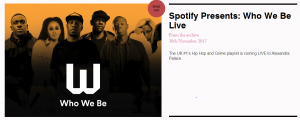
The clear benefit of approaching a brand partnership for your event with influencers is the sheer amount of your audience you will be able to reach.
The above example illustrates the success that partnerships in music events can have, but the same principle can be applied to any industry.
Influencers are not necessarily celebrities and can range from thought leaders in your field, to journalists, directors, CEOs, public speakers, etc. So, take the initiative and invite them to speak at your conference, run a training course alongside your workshop or offer insight at your breakfast event!
4. #CreateAnEventHashtag
In 2013 we spoke about creating a hashtag for your event, and its importance is still crucially relevant.
Easy to tweet out, share on Instagram, and post on Facebook; hashtags are fluid throughout social media and all online platforms for that matter. Thousands of event campaigns use them.
Before you decide on a hashtag idea, make sure you keep to these golden rules:
- Keep it short and memorable: no one is going to take the time to tweet out #networkingsalesconferenceforprofessionalsin2018
- Don’t overthink it: use keywords related to your event
- Make it fun: stand out!
Pro-tip: Use acronyms. If your event is called Nottingham Journalist Event 2018, consider using an easy to remember hashtag like #NJE2018
Once you decide on a hashtag, share it all over your social media, press releases, marketing material and so forth. There is no value in a hashtag if it isn’t used!
5. Use Facebook ads to promote your event
Now that your event is up and running on your Facebook business page, it’s time to increase your chances of getting in front of the audiences that matter most.
Facebook Ads allow you to define the audience you are targeting, whether that is people who have visited your website, or the area surrounding your event location; the possibilities span wide (no matter your budget).
You are then able to monitor and collect responses to see who is actually interested in going to your event.
Not convinced that spending an extra penny will get you a better return? Make sure you follow our top tips to improve your Facebook relevancy score for cheaper Facebook ads!
6. Use Instagram stories to stream live and ask questions
Engaging your audience on social media will give your event more visibility, and more importantly, give your followers interesting content to consume.
Instagram first launched Livestream in 2016, and in less than 6 months, the feature had 250 million daily users – and businesses are taking notice of its power.
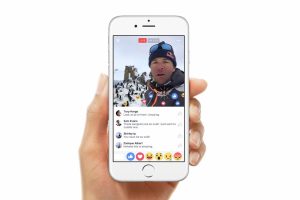
When users first open up Instagram, Livestream appears right above the newsfeed – giving your business Instagram profile an opportunity to shine.
Better yet, followers also receive automatic alerts to their devices whenever someone begins a live stream.

Live streaming tips during events:
- Engage with your followers by asking thought-provoking questions
- Interview speakers, influencers or CEO’s on their opinions
- Film during interesting talks, performances, product debuts, etc.
7. Design a GeoFilter for Snapchat
If you’ve ever heard of On-Demand Snapchat Geofilters, chances are you want to use them to promote your event!
Snapchat Geofilters are designed overlays that are placed over regular Snapchat videos or pictures. So, whether you are celebrating the launch of a product, conference or special event, any business can create custom Geofilters and grab consumer attention.
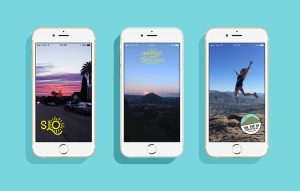
Before you dive into Geofilters, here are some facts you need to know:
- When creating a Geofilter as a business, it’s important to note that you must have rights to include any business names, logos, marks of trademarks.
- Geofilters are available for a maximum of 30 days and must be between 20,000 to 5 million square feet.
If you are looking to design your own Geofilter for your event, consider Canva’s free range of Geofilter templates.
8. Share your event on LinkedIn
With over 330 million active users, LinkedIn is the perfect social platform if you are looking to spread the word about your event in your industry.
The easiest way to get your event out there is to post a status update. Make sure to include eye-catching visuals and consider how your event will add value to your network, and express those ideas in your post.
Reaching out to other professionals or partners directly is another effective way, and may even generate leads to invite guest speakers!
Lastly, your event manager should encourage your employees to share details of your event on their personal accounts too, although this point is optional.
9. It’s all about the #BTS (behind the scenes)
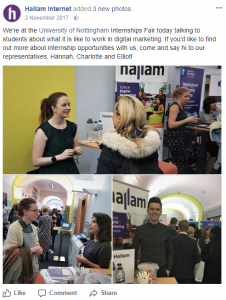 Taking your followers behind the scenes into the secrets of your event production, or even just providing an exclusive look backstage is great content to share leading up to, and during your event.
Taking your followers behind the scenes into the secrets of your event production, or even just providing an exclusive look backstage is great content to share leading up to, and during your event.
Why? Because it:
- Humanises your company
- Creates engaging content that builds trust with your followers
- Reveals how fun it is to work for your company
Facebook, Instagram, Snapchat and Twitter are great hosts for this type of content, whilst LinkedIn should only host professional content.
10. Provide photo opportunities
During your event, it is important to encourage your attendees to post about the event on their social media!
One easy and effective way to achieve this is by setting up a photo booth or backdrop and hire a photographer to map out the shots.

Providing great lighting, shooting from creative angles, and planning shots ahead of your event will increase the chances of the photos being shared all over social media – during and after your event!
Over to you
Social media is an incredibly useful tool to promote your event if done right. Hopefully, this guide has encouraged you to consider using social media to promote your next big event.
Whether a product launch, B2B conference, tradeshow or creative workshop, social media provides endless ways to promote and measure the success of your event before and after.
To learn more about promoting your event through social media, feel free to get in touch!

